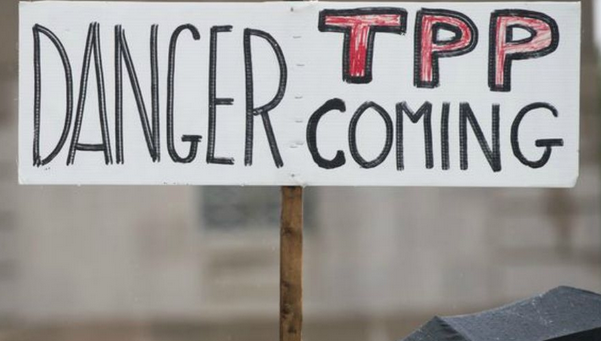

Share
Labor and environmental advocates warn that the proposed Trans-Pacific Partnership trade agreement, whose secretive text was released Thursday, poses significant threats to the economy, environment and public health in Minnesota and beyond.
They called on Minnesota’s Congressional delegation to reject the proposed 12-nation pact, which would set binding rules governing approximately 40 percent of the global economy.
“At first read of the TPP this much is clear – the rich get richer as we race to the bottom,” said Rick Ryan of the Minnesota State Council of the Machinists.
“The USW is opposed to the Trans-Pacific Partnership because it will do nothing to promote manufacturing jobs here in the U.S. In fact, it will promote more job loss through outsourcing to low-wage countries,” added Bob Ryan of the United Steelworkers.
While leaks of various TPP chapters have occurred on more than a half-dozen occasions, Thursday’s published “near final” draft of the entire pact is the first official release of any text since the United States entered the TPP negotiations in February 2008.
The text indicates that the TPP not only affects traditional “trade” matters, such as tariffs and quotas, but also sets rules regarding financial regulations, food safety standards, medicine patents, government procurement, energy exports and more.
“Multinational agribusiness companies wanted this deal. It provides them a framework to lower regulations and expand their market power in multiple countries,” said Karen Hansen-Kuhn of the Institute for Agriculture and Trade Policy. “Unfortunately, the TPP is modeled after past free trade deals that have made wildly inaccurate promises about benefits for farmers. Instead, hundreds of thousands of farmers have been pushed of the land during this era of free trade, beginning with NAFTA.”
“The effects of this trade agreement will be no different than what we have seen in the past: more factories shuttered, middle class families continuing to struggle while our trade deficit skyrockets, and we continue to do business with countries that don’t measure up to our environmental and labor standards,” remarked Kaela Berg, director of the Minnesota Fair Trade Coalition. “Everything from our food, to our medicine, our choices on energy usage, Internet privacy, and even the very air we breathe will be adversely affected by the passage of this trade agreement. Meanwhile, in many of the countries participating in the TPP, abhorrent human rights atrocities are being committed and the rule of law is being rewritten by giant multinational corporations.”
Berg noted that the arguments for the TPP echo rhetoric from past deals that failed to live up to their promises.
“From NAFTA in the 1990s to President Obama’s biggest trade deal to date, the Korea Free Trade Agreement, we’ve been told these pacts address labor and environmental concerns and will create jobs,” Berg said. “Instead, we’ve seen massive job loss, an increase in forced migration, and absolutely zero labor and environmental enforcement. As Congress begins to read and analyze the text of the Trans-Pacific Partnership, we can only hope they do not fall for the same empty promises that have been made with every other free trade agreement to date.”
Reaction to the release of the TPP text was swift and negative. Learn more at the Citizens Trade Campaign website.

